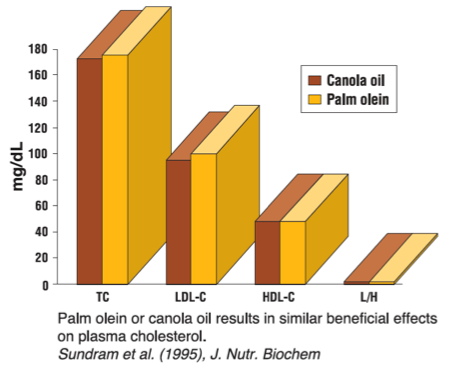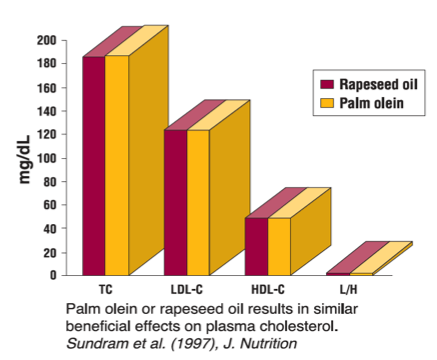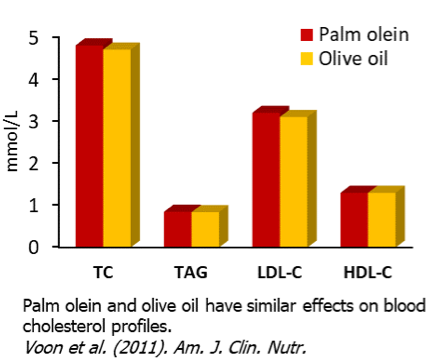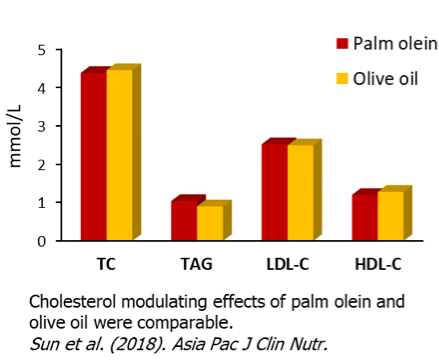In response to a video by Vantage on Firstpost (28th January 2023) entitled “Why Palm Oil Could Be Dangerous for you?” we would like to put the record straight. This video is malicious, unsubstantiated, and misleading. The broadcast portrayed palm oil as unsafe and its consumption lead to serious illness such as heart disease and cancer. It is noteworthy that there is no scientifically proven adverse coronary event or cancer related to long term consumption of palm oil.
The outdated and unsubstantiated claims made in the video are:
- Palm oil can promote heart disease and is linked to cancer
- Jocelyn Zuckerman (author – planet palm): Saturated fats and palm kernel oil are used as replacement for natural creams. Both oils are solid at room temperature, therefore it’s not good when it goes to your artery if you consume too much
- British medical researchers in 1997 concluded that palmitic acid and saturated fat raise blood cholesterol levels and can promote heart disease
- The Mauritius study showed that the change in the government subsidy from palm oil to soybean oil has resulted in a 15% decrease in blood cholesterol in their people. But the study was done in 1980s!
- Glycidyl esters (GEs) is formed when used at high temperature. GE is then digested and broken down into glycidol in the body, and it is shown to trigger growth of benign and malignant tumours in rats
Here are some recent and updated scientific facts about palm oil that will address the malicious and unsubstantiated claims above.
1. Palm Oil is a Nutritious Edible Oil SAFE for Human Consumption
Palm oil, like all other oils, is a healthy component of a balanced diet. Palm oil and its fractions (palm olein and stearin) have similar digestibility just like all other common edible oils and fats consumed in the human diet.
“PALM OIL AND ITS FRACTIONS (PALM OLEIN AND STEARIN) HAVE BEEN RECOGNISED AS EDIBLE OIL/FATS SUITABLE FOR HUMAN CONSUMPTION CITED BY CODEX ALIMENTARIOUS INTERNATIONAL FOOD STANDARDS.”
Experts across the world have confirmed that palm oil is safe and should not be feared. There are more than 165 nutritional studies on palm oil aimed to understand how palm oil effects to the blood lipids and lipoproteins have been carried out around the world.
Still need more enlightenment? Below is a summary of human studies that show palm oil does not cause any harm if it is consumed as per recommendation.
| Reference | Results |
|---|---|
| Siri-Tarino et al., 2010. Am J Clin Nutr., 91(3):535-46. | No significant evidence to conclude that dietary saturated fat is associated with an increased risk of coronary heart disease, cardiovascular disease or stroke. |
| De Souza et al., 2015. BMJ, 351:h3978. | There was no association between total fat intake and the incidence of heart disease, ischemic stroke, type 2 diabetes or death from any of these cause. |
| Chowdhury et al., 2014. Annals of internal medicine, 160(6):398-406. | This study do not clearly support recommendations to encourage high consumption of polyunsaturated fatty acids and low consumption of total saturated fats. |
| Fattore et al., 2014. Am. J. Clin. Nutr, 99:1331–50. | Consumption of palm oil does not pose threat onto blood lipids and on coronary heart disease. |
There are also published human clinical studies that equate palm oil with other oil low in saturated fats such as olive oil and canola oil for similar outcomes on total, LDL and HDL cholesterol in humans.
A study in 2014 from the Mario Negri Institute for Pharmacology in Milan, (American Journal of Clinical Nutrition by Dr. Elena Fattore and Roberto Fanelli), confirmed this and showed that there is no evidence that palm oil is harmful.
2. Palm oil is trans-fat free!
Solid fat is an important ingredient in food industry due to its functionality and stability in food manufacturing. However, to obtain solid fats from low saturated oils, it has to go through partial hydrogenation and this produces trans-fat. Trans-fat is well known for its detrimental health effects to cardiovascular diseases and it is recommended by WHO to consume less than 1% of total energy intake in our diet.
Palm oil is naturally semi-solid in nature, as it contains 50% saturated fat. Palm stearin – the solid fraction of palm oil, is widely used as ingredient in food formulation due to its functionality and versatility. The good news is, palm oil & stearin are trans-fat free!
Although palm stearin is higher in saturated fat than palm oil, it is often used in combination with other oils. As such, its amount of saturated fat contribution to the finished products is relatively small. In agreement with international dietary guidelines, saturated fat intake should be kept at the recommended level (<10% of total energy intake daily). Therefore, if consumed within this limit and followed with a well-balanced diet, palm oil consumption does not increase the risk of cardiovascular disease.
“Why worry about saturated fat in palm oil, when trans-fat of partially hydrogenated oils is clearly the culprit for chronic disease?”
“WHY WORRY ABOUT SATURATED FAT IN PALM OIL, WHEN TRANS-FAT OF PARTIALLY HYDROGENATED OILS IS CLEARLY THE CULPRIT FOR CHRONIC DISEASE?”
3. Palm Olein (Liquid Fraction of Palm Oil) Reduces Cholesterol as Effectively as Olive, Canola and Rapeseed Oil
Numerous clinical research comparing the health effects of palm oil to those of olive and canola oils have shown similar benefits.
“PALM OIL HAS BEEN PROVEN AS AN EXCELLENT SOURCE OF DIETARY FAT, SUITABLE FOR HUMAN CONSUMPTION AS PART OF A HEALTHY, BALANCED DIET.”
All these studies were done by prominent international research institutes globally, and the results revealed that palm oil-rich diet had the same effect on blood cholesterol levels as olive or canola oil. Palm oil was also demonstrated to have no link to the increased risks of heart disease.
This is due to the fact that palm oil contains 40% monounsaturated fat (oleic acid), as well as 10% of other unsaturated fats. This naturally balances the fat composition between unsaturated and saturated fats in palm oil. Palm oil is also rich in vitamin E tocotrienols, natural potent antioxidants which are rarely found in food.
Palm Oil vs Canola Oil, 1995
[Both dietary 18:2 and 16:0 may be required to improve the serum LDL/HDL cholesterol ratio in normocholesterolemic men]

Palm Oil vs Rapeseed Oil, 1997
[Trans (elaidic) fatty acids adversely affect the lipoprotein profile relative to specific saturated fatty acids in humans]

Palm Oil vs Olive Oil, 2011
[Diets high in palmitic acid, lauric and myristic acids, or oleic acid do not alter postprandial or fasting plasma homocysteine and inflammatory markers in healthy Malaysian adults]

Palm Oil vs Olive Oil, 2018
[Effects of palm olein and olive oil on serum lipids in a Chinese population: a randomized, double-blind, cross-over trial]

4. How Much Fats Do We Need To Meet Our Daily Requirement
It was also mentioned in the video that the consumption of palm oil per person per year on a global average was 8 kg. It may sound daunting to some that oil consumption per person per year was 8kg. But do you know that only equals to about 22g per person per day? This is less than 10% of total energy intake, and is still within the 30% recommended consumption of our total fat per day as recommended by World Health Organisation (WHO). For example, a 60 kg male with 2,100 calories intake can consume up to 70 g of total fat per day. As such, it is fine to include palm oil in our food preparation everyday as long as it is within the recommended limit.
“CLEARLY THE VIDEO WAS TRYING TO EXAGGERATE THE FIGURES AND CREATING UNNECESSARY FEARS TO OTHERS.”
5. Is Glycidyl Esters (GE) Only Found in Palm Oil? How about GE Content in Other Edible Oil?
Glycidyl fatty acid esters (GEs) was first discovered in edible oils in the mid-2000s. It is a process contaminant formed at high temperature used during processing and refining of vegetable fats and oils.
“THAT MEANS IT IS NOT ONLY FORMED IN PALM OIL, ALSO FORMED IN OTHER EDIBLE OILS, SUCH AS SOYBEAN, CANOLA, RAPESEED, SUNFLOWER AND OLIVE OIL.”
Glycidol, the hydrolysate of GEs have been identified as rodent genotoxic carcinogens that results in the formation of tumours at tissue sites. However, no research studies and findings are found as yet on humans. EFSA and JECFA have highlighted concerns about the potential health effects of GE. However, the toxicity has not been fully investigated. A number of researchers have identified toxicological data gaps and called for more investigation. Therefore, further research is needed to determine the origins and effects of these contaminants on human health when consumed at average levels over a lifetime. Interestingly, it is noteworthy that based on the current findings, neither EFSA nor JECFA have made any recommendation or dietary adjustments.
Palm oil manufacturers in Malaysia have already implemented successful mitigation measures, resulting in a significant decrease in GE in refined palm oil.
Conclusion
Backed by scientific evidence especially from recent studies, it can be concluded that palm oil is a nutritious vegetable oil suitable and safe for consumption as part of a balanced diet and healthy lifestyle. Therefore, there is no reason for consumer to worry about consuming palm oil. A healthy diet does not only depend on the type of cooking oil used. Instead, it is also crucial to use healthy ingredients such as whole grains, lean protein and vegetables to ensure the meals prepared are well-balanced and nutrient-dense. Nonetheless, portion size of the meals are equally important to make sure the calories does not exceed our energy requirement, as it can lead to many health problems.

